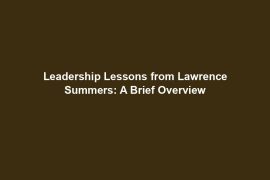Hey there, leadership aficionados! Today, we’re diving into the fascinating world of leadership lessons from none other than George H. W. Bush. The 41st President of the United States had a leadership style worth studying, and we’re here to explore three key lessons that we can all learn from.
But first, let’s talk about why it’s important to study the leadership styles of prominent figures like Bush. By examining the successes and failures of well-known leaders, we can gain valuable insights that we can apply to our own leadership roles. So, get ready to take some notes as we uncover the leadership gems hidden in Bush’s legacy.
In this blog post, we’ll be looking at three key lessons from George H. W. Bush’s leadership playbook. From his unwavering focus on service and duty to his knack for collaboration and relationship-building, there’s plenty to learn from the man who steered the ship of state through turbulent times.
So, grab your favorite cup of coffee and settle in as we kick off our exploration of the first lesson: Focus on Service and Duty. Let’s get started!
Lesson 1: Focus on Service and Duty
Let’s dive into the first key leadership lesson we can learn from George H. W. Bush – focusing on service and duty. The former President was all about serving his country with the utmost dedication and putting duty above personal gain.
Despite coming from a privileged background, Bush never hesitated to roll up his sleeves and serve his country in various capacities. From his time in the military to his roles as a congressman, ambassador, CIA director, and ultimately President, Bush always prioritized the greater good over his own interests.
One shining example of Bush’s dedication to service was his decision to raise taxes in order to reduce the national deficit, despite knowing that it would likely cost him politically. This willingness to make tough choices for the benefit of the country exemplifies his commitment to service and duty.
This focus on service influenced Bush’s leadership decisions and values throughout his career. By always putting the needs of the nation first, Bush was able to earn the respect and trust of the American people, even when they disagreed with his policies.
So, the first lesson we can take away from George H. W. Bush’s leadership style is the importance of focusing on service and duty above all else. By following in his footsteps and prioritizing the greater good, we can become better leaders and make a positive impact on those around us.
Lesson 2: Collaboration and Building Relationships
Now that we’ve talked about Bush’s dedication to service and duty, let’s dive into another key leadership lesson we can learn from him: collaboration and building relationships. George H.W. Bush was known for his ability to work across party lines and build strong relationships with world leaders.
Working Across Party Lines
One of the most impressive aspects of Bush’s leadership style was his willingness to listen to differing viewpoints and work with individuals from all political backgrounds. At a time when partisan divides seem wider than ever, Bush’s example serves as a reminder that effective leadership often requires reaching across the aisle to find common ground.
Building Strong Relationships
During his presidency, Bush forged relationships with leaders from around the world, navigating complex international issues with diplomacy and tact. His ability to build trust and rapport with others not only helped him achieve diplomatic successes, but also fostered a sense of unity and cooperation on the global stage.
The Importance of Collaboration in Leadership
Collaboration and relationship-building are essential skills for any leader, whether in politics, business, or community service. By working together with others and building strong connections, leaders can achieve greater success, inspire trust and loyalty, and create lasting positive change.
So, as we reflect on George H.W. Bush’s leadership legacy, let’s remember the importance of collaboration and relationship-building in our own leadership endeavors. By following his example, we can create a more united and harmonious world, where differences are respected and cooperation is valued.



